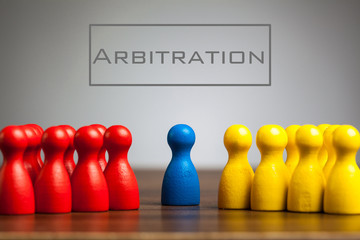Mediation
Family Mediation
John is also a family mediator and arbitrator. John’s sensible approach to resolving all family law disputes helps parties reach a result that works for them – something that may not be attainable in court. John’s knowledge of family mediation/arbitration was clear when he acted as counsel on one of the leading cases on family mediation and arbitration.
On this page, you will find some general information about family mediation and family arbitration. At the bottom, you will find the reasons to choose John as your mediator or arbitrator.
To understand the alternatives to going to court for your divorce, watch this video:

What is Family Mediation?
Family mediation is a voluntary way of resolving disputes where a trained mediator helps parties to resolve disputes about family issues. The mediator does not decide the case. Instead, the mediator helps the parties reach an agreement that is acceptable to both of them.
Who are Family Mediators?
Mediators are usually social workers, lawyers, psychologists, or other professionals. When these professionals work as family mediators, their job is to help parties reach an agreement on support payments, the division of property, custody of and access to the children, or any other family-related issues. Usually, social workers and psychologists are more focused on resolving parenting issues. Lawyers are often more comfortable with the law as it relates to all of the financial issues, although frequently they address parenting issues too so the parties only have to use one mediator. John Schuman has been involved with custody/access and children’s rights cases for more than twelve years, so he is comfortable with mediating parenting issues. Mediators do not take sides or make decisions for the parties. They also cannot give legal advice.



Do I Still Need My Own Lawyer if I Want to Mediate?
A party considering mediation may speak to a lawyer before seeing a mediator. It is helpful to know the law and your rights and obligations before mediation starts. Sometimes parties take their lawyers with them to mediation, because they do not feel confident advocating for themselves, or they want legal advice during the course of the mediation to make sure the discussions are on the right track. It is also important for each party to review any agreement reached during mediation with his or her respective lawyer before signing it. Parties who use mediation still need to get Independent Legal Advice with regard to their settlement if they want to have a separation agreement that a court is likely to enforce. There is a lot more information about why should consult a family lawyer before going to mediation on this page. More information on how lawyers help the mediation process can be found by CLICKING HERE.

Is a Mediation Agreement Binding?
Mediated agreements are not binding until they have been incorporated into a written agreement or a court order. Both parties should obtain Independent Legal Advice before the agreement is finalized to ensure they understand their rights and obligations, as well as the effect of the proposed agreement.
Can What I Say at Mediation Be Used Against Me?
Generally, discussions about settlement are not admissible in court. However, Ontario has two types of mediation in family matters: open and closed.
In closed mediation, all discussions between the parties are confidential and cannot be used as evidence against either party, with very few exceptions (for example, where concerns arise over the welfare of a child). In addition, the mediator will not report to the lawyers or the court on the progress of the mediation or provide an opinion on the issues that have been discussed in mediation to anyone other than the parties themselves.
Open mediation means that the process is not confidential. With open mediation, the agreement to mediate, or mediation contract, may also authorize the mediator to prepare a report once the mediation finishes.
How Long Does Mediation Take?
The mediation process is flexible and can take one session or many. The better prepared the parties are for a mediation meeting, the more productive that meeting will be. It is helpful if the parties have exchanged financial disclosure and figured out the specific areas of disagreement. However, if the issues are complex, a number of meetings may be needed to come to a resolution.
How Much Does Mediation Cost?
Mediators charge by the hour. The hourly rate usually depends on the type of professional and his experience. (John Schuman’s mediation rate is $1900 for a half day and $3600 for a full day, which is shared by the parties.) The longer mediation takes, the more it costs. Some mediators also charge administrative fees in relation to the costs of conducting the mediation (obtaining a room, refreshments, access to some computerized Family Law tools, etc.) John Schuman and the Devry Smith Frank mediation group do not charge an administrative fee in addition to the hourly rate.
Mediation is always less expensive than taking a dispute to trial through the courts.
Do I Have to Prepare for Mediation?
Like most things you will do after separation or divorce, it is best to go in prepared. There are things that you can do to make sure your mediation goes more smoothly, costs less money and is more likely not just to lead to a settlement, but a settlement that is good for you. Speaking to an excellent family lawyer before going to mediation will really help you make sure that your Family Mediation not only works but works for you. There is also some useful legal advice about preparing for Family Mediation in the video below:

What is Arbitration?
Where mediators do not impose a decision on the parties, arbitrators do. The arbitrator is usually an experienced Family Lawyer, psychologist or social worker, who knows Family Law well, and also knows the law with regard to the procedure for conducting a formal hearing to decide issues between the parties.
With arbitration, the arbitrator makes the decisions after reviewing the evidence of the parties.
The idea behind arbitration is that the parties pick their judge, who is known as the arbitrator. In picking an arbitrator, the parties can choose someone who has the same outlook or values as they do. The parties pay that arbitrator an hourly rate for his or her work. However, arbitration is still usually faster and less expensive than court, as the parties and the arbitrator can agree to streamline the process. Also, because the parties are paying the arbitrator, he or she often spends more time getting to know the parties and their situation. Judges are not always permitted the luxury of having a lot of time to spend on a particular case.
John Schuman can also act as an arbitrator or a mediator/arbitrator (see the next question).
What is Mediation/Arbitration?
Mediation/arbitration is the hybrid ADR approach. As the name implies, it is a combination of mediation and arbitration. In this process, all of the earlier procedural steps that are found in a court case (Case Conferences, Settlement Conferences, etc.), are replaced by mediation. If the parties are unable to reach a resolution at mediation, then the same person who was the Mediator becomes the Arbitrator. When the parties decide that a mediated result is not possible, the Arbitrator makes a binding decision on the issues. However, the Mediator/Arbitrator cannot base his or her decision on what occurred at mediation. There must still be a formal arbitration hearing or, for temporary matters, formal motions. How those motions or the final arbitration hearing takes place is exactly the same as if the parties had decided just to go to arbitration.

Helpful Video on Family Mediation
The video below tells you what you need to know to decide whether family mediation is right for you. If it is right for you, this video also tells you what you need to know to make sure your mediation goes smoothly and has the best possible chance of success.
What is Parenting Coordination?
Parenting coordinators help separated parents who have difficulty agreeing on day-to-day parenting issues to resolve those issues. Parenting coordinators are usually social workers, psychologists or family lawyers with an interest in child welfare. They take a child-centred approach to looking at disagreements between parents over parenting issues and they suggest possible resolutions to those issues. Parents can agree, or the court might be able to order, that a parenting coordinator will have the powers of an arbitrator to make a decision when the parents cannot agree. Since the process involves a child-centred professional, parenting coordination is a very popular way to address minor parenting issues in situations of parents who are always in conflict. Although parenting coordinators are privately retained, it is usually cheaper to pay one parenting coordinator than two lawyers to resolve issues such as when and where access exchanges will take place, how to get information from a child’s school, or which parent will attend what school functions. The downside of parenting coordination is that it can provide easy access to a forum to keep fighting if one or both parents want to continue the conflict. However, if both parents want to find ways to end their conflict, parenting coordinators may be able to teach them how.
John Schuman also provides parenting coordination either as part of a mediation, mediation-arbitration or as a stand-alone service.
What is Screening?
Alternative dispute resolution processes are voluntary. Both parties must agree to use the alternative dispute resolution process. They must also agree on who the mediator or arbitrator will be and some rules that govern the process. To ensure that the ADR process is voluntary, the mediator or arbitrator must screen the parties for power imbalances or domestic violence issues that might allow one party to coerce the other. If the parties cannot agree on the ADR process, or if there is a power imbalance that means one of the parties is not entering the process freely, then the parties must go to court and follow the court’s procedures. Devry Smith Frank screens for domestic violence and power imbalances throughout the process (Ontario Law requires all mediators and arbitrators to do this.) The parties may need to have separate appointments or telephone calls with the mediator to do this screening. An arbitrator does not screen the parties for domestic violence or power imbalances to ensure the arbitrator remains impartial. Fortunately, there are several people at Devry Smith Frank who are trained to do this screening, so parties will not have to go someplace else to get it done.
Why Mediate with John Schuman?
- John is a Certified Specialist in Family Law, which means he knows Ontario Family Law inside and out, and he knows all about what matters to people in separation and divorce.
- John’s extensive experience with complex and difficult cases means he knows how to find solutions for the hardest family law problems.
- John has practised child and family law exclusively since 1999.
- John obtained a Masters (specialized) Degree in Family Law in 1999 from Queen’s University.
- Before his Master’s degree. John clerked for a family court judge.
- John has extensive experience in high-conflict cases.
- John has extensive experience in complex financial family law cases.
- John is a member of the Association of Family and Conciliation Courts and is “up to date” on the latest research relevant to family law issues.
- John has been counsel on several precedent-setting, reported cases. (See above.)
- As a trained family law mediator and arbitrator, John brings a child-focused, comma sense approach to resolving Family Law Disputes.
- John is an author of several important and leading books about how the law applies to children and families.
- John practices in a firm that has specialists in almost every area of law, allowing “non-family law” solutions to family problems, and also ensuring every aspect of the client’s legal needs are met (even identifying problems that clients did not.)
SEARCH THIS SITE TO FIND WHAT YOU NEED

Contact Us
To contact John Schuman, Certified Specialist in Family Law, call 416-446-5847, email him at john.schuman@devrylaw.ca, or use the form on this page.
